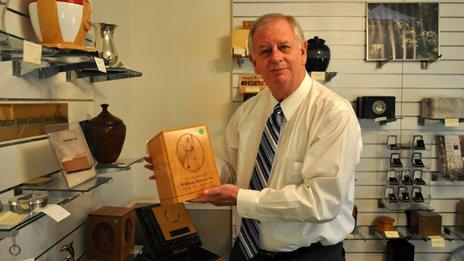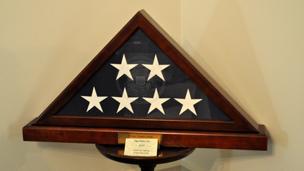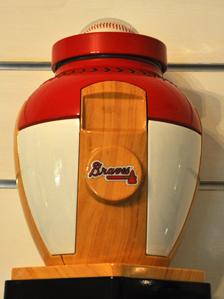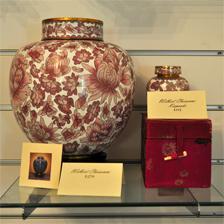Funeral homes turn cremation into hot new business
- Published

Nicodemus says funeral home directors must give cremation consumers a choice of urns, ash accessories and memorial options
A surge in popularity for cremations in the US is threatening to overwhelm its "mom-and-pop" funeral homes, which count on big burials for their profits.
The recipients of the pricey goods Mike Nicodemus sells will not be around to enjoy them.
For the baseball fan, he offers a cremation urn with the favourite team's logo. Military veterans can spend eternity encased in a bronze container inscribed with the emblem of their service, or in a case displaying an American flag.
The brightly lit cremation showroom at Hollomon-Brown Funeral Home and Crematory in Virginia Beach is the culmination of Nicodemus's effort to turn cremation into a touch-and-feel consumer activity akin to shoe shopping and wedding planning.
"Let them look around, let them shop, let them browse to see what's out there," he says. "If you don't take the initiative during the arrangement conference to let that family know what's available, they don't know."

For the veteran: Stars and stripes, and ashes
With the rise in cremation devastating funeral homes' bottom lines, the independently owned businesses that constitute about 90% of the industry must embrace the trend and capitalise on it, say Nicodemus and other industry leaders.
That means building inviting show rooms to display urns and accessories, convincing families to pay for custom memorial services, and for some, rebranding themselves as regional cremation specialists.
"The funeral directors that will be successful going forward are those that aren't afraid of cremation," says Lawrence Little, founder of Alternatives Funeral and Cremation Service in British Columbia, Canada.
The number of Americans and Canadians being cremated upon their deaths is rising sharply, according to data collected by the Cremation Association of North America. Both countries lag far behind Britain, where funeral directors confronted the shift decades ago.
Americans are more conservative and religious in their attitudes towards the final disposition of their loved ones than Britons, death care industry experts say.
Evidence for that can be seen in the regional breakdown: Cremation is least prevalent in the so-called "Bible belt" states of the South-East.
And both Canada and the US have much more open space to bury bodies than Britain.
Nevertheless, cremation has surged in popularity in both countries, overwhelming unprepared funeral homes.
Compared to traditional burial, the process is more flexible - far flung families who need not gather immediately to bury a relative have more time to plan memorial services. And cremation is seen as more ecologically friendly - traditional burials consume land and must be maintained into perpetuity.

A supporter for life - and death: Eternity with your baseball team's logo
An immediate, no-frills cremation is much less expensive than a full-service burial: $2,070 (£1,299) on average, compared to $7,755, according to the National Funeral Directors Association.
As cremation has grown in popularity, employment in "death care" businesses has declined from 137,000 in 2005 to 132,000 in 2010, according to the Bureau of Labor Statistics.
Especially hard hit were skilled embalmers: Employment in that profession declined 28% in the same period.
Meanwhile, employment in all service-providing industries grew 9.5%.
And in November and February, two of the largest publicly traded funeral home chains in the country warned investors the continuing upward trend in cremation could harm revenue and turnover.
The key, say industry leaders say, is for funeral directors to steer families away from immediate "direct cremation" with a no-frills container for the ashes toward more costly urns, ash accessories and services.
When families inquire about cremation in Nicodemus's Hollomon-Brown funeral home, his staff seats them in his urn showroom and lets them browse before meeting them.
Urns in porcelain, wood and metal line shelves on the walls. Jewellery - with space to hold a pinch of grandma or grandpa - sells well, as do smaller "keepsake" urns so relatives can keep some on the mantel after burying or scattering the rest. Wind chimes encasing a sprinkling of mum will remind the children of her with every breeze.
Nicodemus estimates he is able to up-sell as many as 60% of families who walk in his door asking about cremation.
To encourage families to think beyond a simple cremation, staff at Dimbleby, Friedel, Williams and Edmunds Funeral Homes in central New York state suggest they have a look at the body before sending it into the crematory, says Albert Abdulla, a funeral director there.
"It's always a positive experience for people to come in and view," he says, "and we've had that turn around for us: They thought that their loved one looked so good they wanted to go ahead with a public viewing" before the cremation.
Alternatives Funeral and Cremation Service in British Columbia in the last year devised what founder Little describes as a new category of memorial service - elaborately planned with themes based on the life and interests of the departed.
"We're very consumer-oriented, we've done the homework, we now know for sure that a lot of families know what they don't want, but they do not know what they do want," says Little.

The remains can be divided between a matching burial urn and "keepsake" for the mantel
For a deceased helicopter pilot's memorial service, Little hired an airport hanger, to which the the family - and the ashes - were conveyed in a helicopter. The guest book was designed with an aviation chart motif.
Another man loved to gamble and drink Heineken beer. Little's staff hired his local pub, staff dressed as croupiers manned table games with cards printed with his photo, and served Heineken beer with his face on the label.
"There is an emotional payoff for the family, and that's what there needs to be in anything a consumer buys, particularly in something as sensitive as this," Little says.
"The baby boomers want personalisation, they want customisation. They may not know what exactly what they want, but they want options and they want alternatives."
- Published14 March 2012
- Published21 February 2012